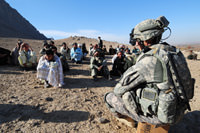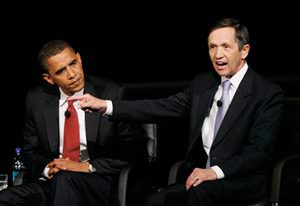Tony Blankley: Pelosian Honesty
The new House speaker's minions want to placate their antiwar supporters, but not actually end the war. Meanwhile, Republicans need to call the "surge" by its real name: an escalation.Tony BlankleyWhen Mohandas Gandhi (aka The Mahatma — the great soul) was asked what he thought about Western civilization, the heir to 5,000 years of Hindu civilization responded: “It would be a very good idea.” In that spirit of the new Washington bipartisanship (we will see unicorns grazing on the Capitol lawns and lions laying down with lambs in Washington’s green and gentle Arcadian fields before we actually spot genuine bipartisanship in Washington), I am delighted to fully endorse Speaker Nancy Pelosi’s recent call for honest talk both with her colleagues and the American people. Of course, honesty is in little danger of actually happening very often.
I had my first encounter with Pelosian honesty last week — as practiced by several liberal Democrats on the various radio and television discussions in which I participated (and elsewhere) — on the thorny political question of whether the Democratic-controlled Congress will cut off the money for President Bush’s imminent call for more troops to Iraq.
To review the bidding: (1) The Democrats cheerfully campaigned all last year on “redeploying” our troops out of Iraq. (2) Now that they are in charge, many of their voters want and expect them to legislate their campaign promise. (3) The Democrats want to continue to express their unflinching determination to oppose the war and bring the troops home.
Their problem is that many Democratic Party leaders don’t want to actually cut off the money necessary to fight the war for fear that if things go badly, they might be held responsible by the voters in 2008 for a Middle East catastrophe. So, last week, many of their spokesmen and journalistic handmaidens (and handsquires) denied that Congress had the power to cut off the war money, particularly for the new troops that the president will presumably be sending over soon.
For example, Sen. Joe Biden questioned whether Congress had the “constitutional” power to do so. One of the panelists on “The McLaughlin Group” asserted to me that President Bush had enough money “sloshing around the Pentagon” not to need new congressionally appropriated money. But, of course, the president cannot spend the already appropriated defense funds willy-nilly. If Congress appropriated funds for buying tanks, he can’t take that money and use it to pay troops, for example.
To make up for their political hesitation in using their lawful power to cut off the dollars, they are supercharging their rhetoric. When I was on “Hardball” last week, Rep. Debbie Wasserman Schultz, D-Fla., charmingly waxed wrath over what she would do to those rascally Republicans in the White House. She would, among other things, “hold their feet to the fire” (which sounds worse than water-boarding). The one thing she wouldn’t quite say was that she would actually vote to cut off the money. And, without wishing to deprecate the merits and value of the congresswoman’s words, I suspect that the president would be more deeply affected by her vote to cut off the money than by her words of earnest chastisement of his policy.
So let’s follow Speaker Pelosi’s sage advice and speak honestly to the American people about the war. The president will fairly soon need a supplemental appropriation to fund the next tranche of the wars in Iraq and Afghanistan. At that time, the Democratic majorities in the House and Senate can pass a bill that appropriates money for some things and not for others. They can, for instance, pass a bill that says that not one dollar may be spent to fund further combat pay for troop levels above a certain level in Iraq. The president can veto such legislation (as Clinton did with some Gingrich-era appropriations — thus shutting down the government). But he can’t get a single new penny until Congress passes and he signs a bill. To be clear, the president has the constitutional authority as commander in chief to send the extra troops into battle. But he also will need the money to send them.
While Mrs. Pelosi herself has now raised the possibility of cutting off money (good for her honesty on this point — though not for her policy), her minions are still trying to have it both ways — they want to placate their antiwar supporters, but not end the war.
And, let me challenge the Republicans, too, while I am on my jihad against political parties not honestly defending their positions even though they “can indeed be defended, but only by arguments which are too brutal for most people to face, and which do not square with the professed aims of the political parties” (George Orwell, “Politics and the English Language”).
The expected troop increase in Iraq is not a surge — a surge being a transient, sudden rise. There is no plausible military theory which would rely on a brief increase in troop strength followed by the immediate withdrawal of such troops from Iraq.
The troops would surely be in theater for an indefinite period. The words escalation, re-enforcements and higher sustained troop levels would all be honest. The word surge is deceptive.
While it would be impractical to expect brutal verbal honesty in politics on a regular basis, when we are talking about war and peace, about life and death of our young citizen warriors, we owe them (and ourselves) as much honest talk as we can muster.
Tony Blankley is editorial page editor of The Washington Times. To find out more about Tony Blankley and read his past columns, visit the Creators Syndicate website at www.creators.com.
Copyright 2007 Creators Syndicate
Your support matters…Independent journalism is under threat and overshadowed by heavily funded mainstream media.
You can help level the playing field. Become a member.
Your tax-deductible contribution keeps us digging beneath the headlines to give you thought-provoking, investigative reporting and analysis that unearths what's really happening- without compromise.
Give today to support our courageous, independent journalists.





You need to be a supporter to comment.
There are currently no responses to this article.
Be the first to respond.